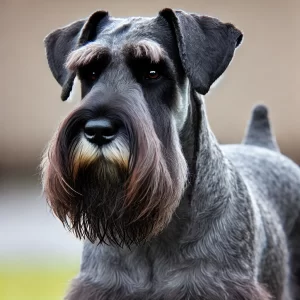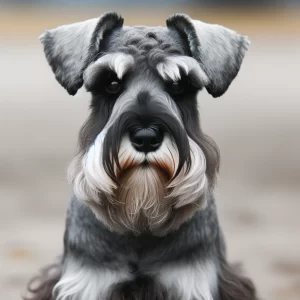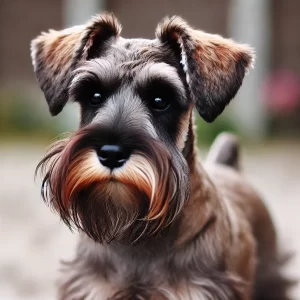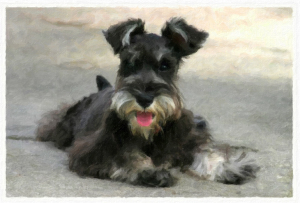The Different Types of Schnauzers:
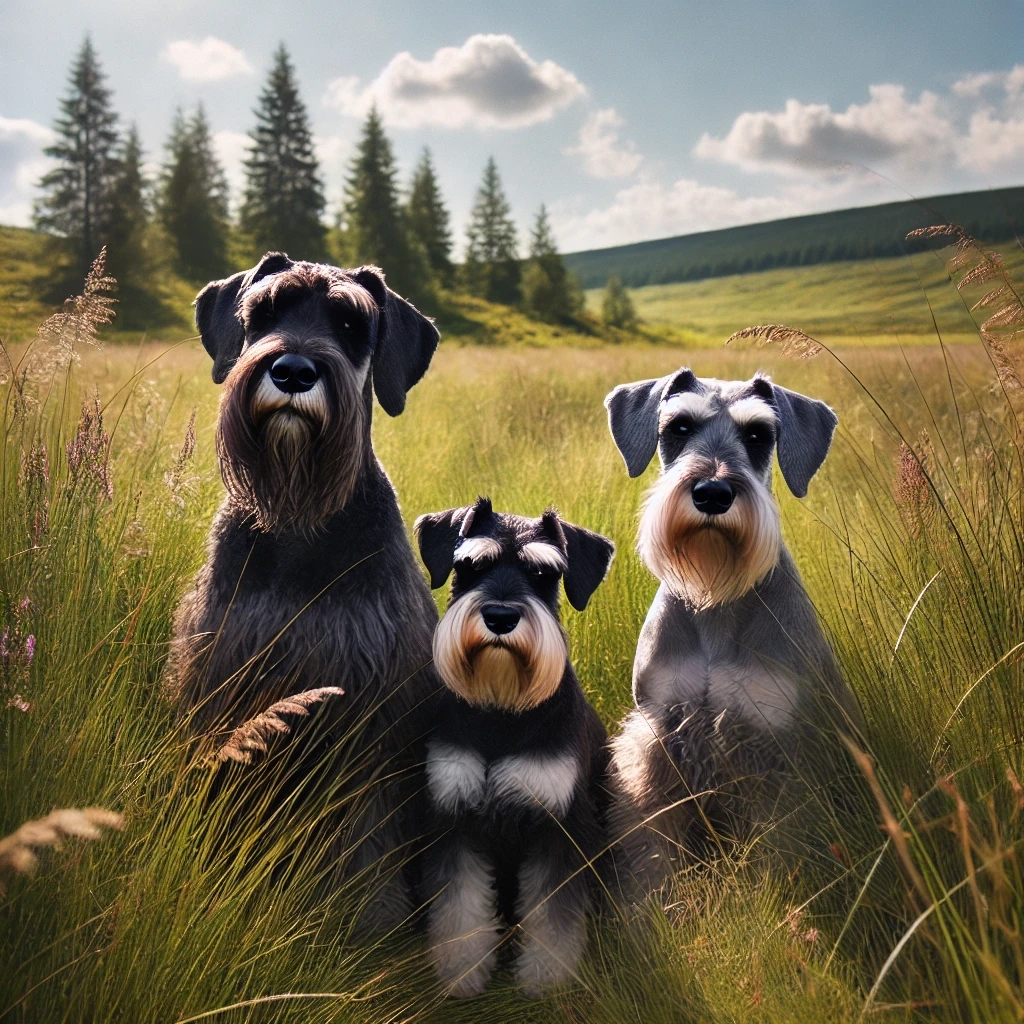
A giant, standard, and mini schnauzer sitting together outdoors in a natural setting on a bright summer day
A Comprehensive Guide
Schnauzers are a versatile breed that come in three distinct sizes, each with its own unique characteristics and history. Whether you’re looking for a family companion, a working dog, or a combination of both, the different types of Schnauzers offer something for everyone. Here’s a look at the three varieties and what sets them apart.
The Three Types of Schnauzers
1. Giant Schnauzer
The Giant Schnauzer is the largest of the three types. Originally bred in Germany to help farmers drive cattle and guard properties, this strong and intelligent breed requires plenty of exercise and mental stimulation.
Characteristics
- Height: 60-70 cm (24-28 inches)
- Weight: 32-45 kg (70-100 pounds)
- Temperament: Loyal, protective, and energetic
- Coat: Dense, wiry, and weather-resistant
- Training needs: Requires firm, consistent training due to their size and intelligence
The Giant Schnauzer thrives in active households that can provide regular physical and mental challenges. They often serve in police and military roles due to their protective instincts and problem-solving abilities.
2. Standard Schnauzer
The Standard Schnauzer is the original version of the breed, and its history dates back to the 15th century in Germany. Known for being a versatile working dog, Standard Schnauzers were used as ratters, farm dogs, and guard dogs.
Characteristics
- Height: 45-50 cm (18-20 inches)
- Weight: 14-20 kg (30-45 pounds)
- Temperament: Playful, intelligent, and alert
- Coat: Similar to the Giant Schnauzer, with a wiry outer coat and a softer undercoat
- Training needs: Highly trainable but needs clear boundaries and structure
As a medium-sized breed, the Standard Schnauzer combines the energy and playfulness of smaller dogs with the guarding instincts of larger breeds, making them ideal for families and individuals looking for a well-rounded pet.
3. Miniature Schnauzer
The Miniature Schnauzer is the smallest of the three varieties but shares many of the same traits as its larger cousins. It was developed in the late 19th century by breeding Standard Schnauzers with smaller dogs like Poodles and Affenpinschers. Despite their small size, Miniature Schnauzers are known for their bold personalities.
Characteristics
- Height: 30-35 cm (12-14 inches)
- Weight: 5-9 kg (11-20 pounds)
- Temperament: Friendly, energetic, and intelligent
- Coat: Coarse, wiry coat that requires regular grooming
- Training needs: Needs firm, positive reinforcement training to manage their strong-willed nature
Miniature Schnauzers are excellent companions for people living in smaller spaces, like apartments, but they still need daily exercise and mental engagement to stay happy and healthy.
Here are five reasons why a Schnauzer can be a great addition to your family:
1. Intelligent and Trainable
Schnauzers are highly intelligent and quick learners. They thrive in environments where they can be mentally stimulated, making them relatively easy to train. Their sharp minds allow them to excel in obedience training, tricks, and even dog sports like agility.
2. Great Family Companions
Schnauzers are known for their loyalty and affection towards their family members. They bond closely with their human companions and are especially good with children, making them excellent family dogs. They are social, playful, and love being around their family, providing constant companionship.
3. Adaptable to Different Living Environments
Whether you live in a house with a yard or a small apartment, Schnauzers can adapt well to various living situations. As long as they get regular exercise and mental stimulation, they can thrive in both urban and rural settings. Their moderate size, especially the Miniature Schnauzer, makes them ideal for smaller homes.
4. Low-Shedding and Hypoallergenic
Schnauzers have a wiry coat that sheds very little, making them a great choice for families with allergies. Although they require regular grooming, their low-shedding coat reduces the amount of pet hair in your home, keeping things cleaner and minimizing allergy triggers.
5. Alert and Protective
Schnauzers, regardless of their size, are naturally alert and protective. They make excellent watchdogs and will quickly alert their family to any potential dangers or strangers approaching the home. Despite their protective nature, they are not overly aggressive and can be trained to behave appropriately in different social situations.
These traits make Schnauzers a wonderful addition to many different types of families, providing love, protection, and companionship.
Here are three potential reasons why a Schnauzer might not be the best fit for everyone:
1. High Grooming Requirements
As mentioned before, Schnauzers have a wiry coat that requires frequent grooming to prevent matting and maintain their iconic appearance. Regular brushing, trimming, and professional grooming can be time-consuming and costly. If you prefer a dog with minimal grooming needs, this might be a drawback.
2. Potential for Stubbornness
Schnauzers are intelligent, but they can also be quite independent and strong-willed. This can sometimes lead to stubborn behavior, especially if they aren’t properly trained or mentally stimulated. If you’re a first-time dog owner or prefer a dog that’s naturally more compliant and eager to please, a Schnauzer’s independent streak could be challenging.
3. High Energy Levels
Schnauzers, particularly the Miniature and Standard varieties, have a lot of energy and need regular exercise to stay healthy and happy. They thrive on mental and physical stimulation, and if they don’t get enough, they can become bored and may develop undesirable behaviors, such as excessive barking or digging. If you have a more sedentary lifestyle or can’t commit to daily exercise and playtime, a Schnauzer might not be the best match for you.
Conclusion
Whether you prefer the large, imposing Giant Schnauzer, the versatile Standard Schnauzer, or the small but bold Miniature Schnauzer, these breeds are united by their loyalty, intelligence, and adaptability. When choosing a Schnauzer, consider your lifestyle and what you’re looking for in a companion to find the perfect match.




